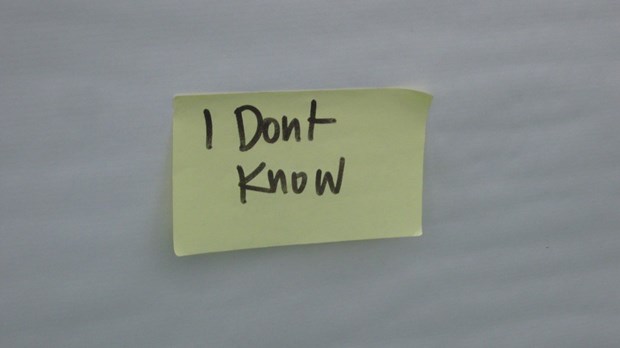
In 35 years of ministry, I've been asked a lot of questions.
Some are easy to answer, others leave me scratching my head.
I used to stress over the hard questions. Or give pat answers. Or take a stab at an answer and hope I’m right.
I don't do that anymore, since I learned the value of three wonderful words.
I. Don’t. Know.
I encourage every pastor to memorize and use those three words. Not a lot. But whenever appropriate.
Here are 9 reasons why:
1. It's Honest
There is no more essential element to life, faith and leadership than the mandate to tell the truth. If you don’t know it, admit it.
An honest ‘I don’t know’ is always better than a false answer.
2. It Builds Trust
This feels counterintuitive.
We think we’ll lose people's trust if we don’t have all the answers. The opposite is almost always true.
Saying ‘I don't know’ when you don't have an answer lets people know you’re not faking it when you do have an answer.
People are more willing to trust leaders who are honest about their vulnerabilities than those who only show their strengths.
3. It’s Less Damaging than a Fake or Simplistic Answer
When people ask hard questions from their pastor, the stakes are often very high. Their faith might be hanging in the balance. This is not the time to spitball it.
If we really know the answer, we should give it. But if we don’t, a fake or pat answer can send them down a bad path. It’s less dangerous to be ignorant than wrong.
4. Sometimes a Hard Question Is Hiding a Deeper Issue
When people ask hard questions, they’re not looking for easy answers.
Sometimes they’re not looking for answers at all. Just an listening ear, a praying friend or a reassuring conversation.
For instance, when we answer a devastating question such is “why did God let my loved one die?” with a pat theological answer about fallen humanity, we might miss the chance to cry with those who cry. In situations like that, the tears of a friend are better than the answers of an expert.
5. It Demonstrates Humility
A pastor’s typical day is filled with the most complex aspects of life. God, theology, the Bible and people.
If you must have an answer for every question, get a job at Google. Pastoral ministry requires bucket loads of humility.
6. It Honors God
Saying ‘I don’t know’ is not the same as saying ‘God doesn’t know.’
We don’t know everything God knows. We honor him when we admit that.
7. It Respects People's Intelligence
You know those times when you’re scrambling for an answer, tripping over your words, or saying “um” a lot? People aren’t fooled. They’ve figured out that you don’t know the answer to their question.
By the time we have the humility to admit we don’t have the answer, they already know it. They’re just happy to hear us admit it.
8. It Encourages People to Find the Answer for Themselves
Pastors are called to equip the saints, not spoon-feed them.
When we say ‘I don’t know’ in an environment of discipleship, it can be a great catalyst for people to use the tools we’re (hopefully) teaching them to seek out the answers for themselves.
An answer we discover for ourselves is always more valuable and memorable than the answer someone else gave us.
9. It Leaves Room for Wonder
Some answers will never be found this side of heaven.
Other things aren’t meant to be answered. We’re just supposed to sit in awe and wonder over them.
Sometimes taking the time to ponder a divine mystery is more valuable than finding a definitive answer.
Copyright © 2016 by the author or Christianity Today/Leadership Journal. Click here to read our guidelines concerning reprint permissions.
Pivot is a part of CT's
Blog Forum. Support the work of CT.
Subscribe and get one year free.
The views of the blogger do not necessarily reflect those of Christianity Today.
Join in the conversation about this post on Facebook.
- A Discipleship Strategy Small Churches Can Actually Follow, with Darrell Stetler (Ep 38)Darrell and Karl talk about the importance of discipleship in the life of the church – and as a central role in our calling as pastors.
- Why Proximity and Longevity Matter in Pastoral Ministry, with Alan Briggs (Ep 36)Karl interviews Alan Briggs, a pastor, the author of Staying is the New Going, the host of the Right Side Up Leadership podcast and StayForth.com.
- Seculosity: Ministry In The Era Of Secular Religion, with David Zahl (Ep 37)Karl Vaters interviews David Zahl, author of Seculosity: How Career, Parenting, Technology, Food, Politics, and Romance Became Our New Religion and What to Do about It.
- Should You Start a Podcast? And Positive Ministry Trends, with Aron Utecht (Ep 35)Karl Vaters interviews Aron Utecht, a pastor and the host of the Good Ideas for Churches podcast















